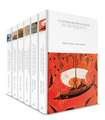A Cultural History of Race: Volumes 1-6: The Cultural Histories Series
Editat de Marius Turdaen Limba Engleză Quantity pack – 3 noi 2021
Din seria The Cultural Histories Series
- 13%
 Preț: 204.45 lei
Preț: 204.45 lei - 43%
 Preț: 490.99 lei
Preț: 490.99 lei - 13%
 Preț: 191.26 lei
Preț: 191.26 lei - 30%
 Preț: 511.46 lei
Preț: 511.46 lei - 30%
 Preț: 542.77 lei
Preț: 542.77 lei - 43%
 Preț: 419.45 lei
Preț: 419.45 lei - 43%
 Preț: 440.48 lei
Preț: 440.48 lei - 43%
 Preț: 441.17 lei
Preț: 441.17 lei - 30%
 Preț: 2850.60 lei
Preț: 2850.60 lei - 30%
 Preț: 2849.15 lei
Preț: 2849.15 lei - 13%
 Preț: 200.89 lei
Preț: 200.89 lei - 5%
 Preț: 3138.94 lei
Preț: 3138.94 lei - 30%
 Preț: 510.27 lei
Preț: 510.27 lei - 43%
 Preț: 419.45 lei
Preț: 419.45 lei - 30%
 Preț: 511.74 lei
Preț: 511.74 lei - 13%
 Preț: 202.66 lei
Preț: 202.66 lei - 43%
 Preț: 440.48 lei
Preț: 440.48 lei - 13%
 Preț: 187.70 lei
Preț: 187.70 lei - 43%
 Preț: 418.49 lei
Preț: 418.49 lei - 30%
 Preț: 2847.93 lei
Preț: 2847.93 lei - 13%
 Preț: 189.02 lei
Preț: 189.02 lei - 30%
 Preț: 544.48 lei
Preț: 544.48 lei - 13%
 Preț: 189.02 lei
Preț: 189.02 lei - 30%
 Preț: 543.66 lei
Preț: 543.66 lei - 30%
 Preț: 542.84 lei
Preț: 542.84 lei - 30%
 Preț: 511.14 lei
Preț: 511.14 lei - 30%
 Preț: 512.37 lei
Preț: 512.37 lei - 30%
 Preț: 510.86 lei
Preț: 510.86 lei - 43%
 Preț: 419.45 lei
Preț: 419.45 lei - 43%
 Preț: 419.45 lei
Preț: 419.45 lei - 43%
 Preț: 416.26 lei
Preț: 416.26 lei - 30%
 Preț: 3006.52 lei
Preț: 3006.52 lei - 43%
 Preț: 439.79 lei
Preț: 439.79 lei - 13%
 Preț: 202.22 lei
Preț: 202.22 lei - 43%
 Preț: 419.45 lei
Preț: 419.45 lei - 43%
 Preț: 440.48 lei
Preț: 440.48 lei - 43%
 Preț: 440.48 lei
Preț: 440.48 lei - 40%
 Preț: 488.97 lei
Preț: 488.97 lei - 43%
 Preț: 414.88 lei
Preț: 414.88 lei - 30%
 Preț: 2854.02 lei
Preț: 2854.02 lei - 13%
 Preț: 189.02 lei
Preț: 189.02 lei - 43%
 Preț: 416.26 lei
Preț: 416.26 lei - 43%
 Preț: 419.03 lei
Preț: 419.03 lei - 13%
 Preț: 188.39 lei
Preț: 188.39 lei - 30%
 Preț: 543.36 lei
Preț: 543.36 lei - 43%
 Preț: 489.75 lei
Preț: 489.75 lei
Preț: 2699.93 lei
Preț vechi: 3858.54 lei
-30% Nou
Puncte Express: 4050
Preț estimativ în valută:
516.62€ • 539.40$ • 427.58£
516.62€ • 539.40$ • 427.58£
Carte disponibilă
Livrare economică 14-28 martie
Preluare comenzi: 021 569.72.76
Specificații
ISBN-13: 9781350067578
ISBN-10: 1350067571
Ilustrații: 300 bw illus
Dimensiuni: 266 x 184 x 99 mm
Greutate: 3.61 kg
Editura: Bloomsbury Publishing
Colecția Bloomsbury Academic
Seria The Cultural Histories Series
Locul publicării:London, United Kingdom
ISBN-10: 1350067571
Ilustrații: 300 bw illus
Dimensiuni: 266 x 184 x 99 mm
Greutate: 3.61 kg
Editura: Bloomsbury Publishing
Colecția Bloomsbury Academic
Seria The Cultural Histories Series
Locul publicării:London, United Kingdom
Caracteristici
61 experts, 60 chapters and c. 1,728 pages explore the cultural evolution of race in relation to social, political and environmental thought from c. 500 BCE to the present day
Notă biografică
Marius Turda is Professor in Central and Eastern European Biomedicine at Oxford Brookes University, UK. He is the author of Eugenics and Nation in Early 20th Century Hungary (2014); Modernism and Eugenics (2010); The Idea of National Superiority in Central Europe, 1880-1918 (2005), co-author (with Maria Sophia Quine) of Historicizing Race (2018), and the editor of The History of Eugenics in East-Central Europe, 1900-1945: Sources and Commentaries (2015) and Religion, Evolution and Heredity (2018).
Cuprins
Volume One: A Cultural History of Race in Antiquity Edited by Denise McCoskey, Miami University, USA1. Definitions and Representations of Race, Sarah Debrew2. Race, Environment, Culture, Joseph Skinner3. Race and Religion, Denise Kimber Buell4. Race and Science, David Kaufman5. Race and Politics, Grant Parker6. Race and Ethnicity, Naoise Mac Sweeney7. Race and Gender, Shelley P. Haley8. Race and Sexuality, Jackie Murray9. Anti-Race, Dan-el Padilla PeraltaVolume Two: A Cultural History of Race in the Medieval Age Edited by Thomas Hahn, University of Rochester, USA1. Definitions and Representations of Race, Christine Chism2. Race, Environment, Culture, Suzanne Conklin Akbari3. Race and Religion, David Nirenberg4. Race and Science, Maaike van der Lugt5. Race and Politics, Geraldine Heng6. Race and Ethnicity, Thomas Hahn7. Race and Gender, Sarah Salih8. Race and Sexuality, Steven F. Kruger9. Anti-Race, William Chester Jordan and Helmut ReimitzVolume Three: A Cultural History of Race in the Renaissance and Early Modern Age Edited by Kimberly A. Coles, University of Maryland, USA and Dorothy Kim, Brandeis University, USA1. Definitions and Representations of Race, Geraldine Heng2. Race, Environment, Culture, Adam Miyashiro3. Race and Religion, Dorothy Kim4. Race and Science, Rebecca Redfern and Joseph T. Hefner5. Race and Politics, Matthew Vernon6. Race and Ethnicity, Kathy Lavezzo7. Race and Gender, Dorothy Kim and Michelle M. Sauer8. Race and Sexuality, M. W. Bychowski and Robert Sturges9. Anti-Race, Asa Simon MittmanVolume Four: A Cultural History of Race in the Reformation and Enlightenment Edited by Nicholas Hudson, University of British Columbia, Canada1. Definitions and Representations of Race, Dennis Austin Britton2. Race, Environment, Culture, Jean E. Feerick3. Race and Religion, Robert Bernasconi4. Race and Science, Suman Seth5. Race and Politics, Matthew Bennett6. Race and Ethnicity, Noémie Ndiaye7. Race and Gender, Carl Plasa8. Race and Sexuality, Nicholas Hudson9. Anti-Race, Roxann WheelerVolume Five: A Cultural History of Race in the Age of Empire and Nation StateEdited by Marina Mogilner, University of Illinois at Chicago, USA1. Definitions and Representations of Race, Roland Cvetkovski2. Race, Environment, Culture, Emily Kern3. Race and Religion, Marwa Elshakry4. Race and Science, Projit Bihari Mukharji5. Race and Politics, Sergey Glebov6. Race and Ethnicity, Richard McMahon7. Race and Gender, Maria Sophia Quine8. Race and Sexuality, Myrna Perez Sheldon9. Anti-Race, Lynn M. HudsonVolume Six: A Cultural History of Race in the Modern and Genomic Age Edited by Tanya Golash-Boza, University of California Merced, USA 1. Definitions and Representations of Race, Saher Selod2. Race, Environment, Culture, Lila Sharif3. Race and Religion, Raymond Taras4. Race and Science, Garland E. Allen and Alan Templeton5. Race and Politics, Manuela Boatca6. Race and Ethnicity, Peter Kivisto7. Race and Gender, Alpa Parmar8. Race and Sexuality, Richard Cleminson9. Anti-Race, George Dei Nana Adusei Sefa Tweneboah and Asna Adhami
Recenzii
Each volume, despite their unique content and editorial flourish, offers the same nine identical chapter titles and topics: "definitions and representations of race"; "race, environment, culture"; "race and religion"; "race and science"; "race and politics"; "race and ethnicity"; "race and gender"; "race and sexuality", and; "anti-race". This simple and elegant decision helps to synchronize the volumes, allowing for ease of topical comparison and transforming otherwise discordant chronicles into "useable pasts".
The detailed, deep and comparative historicization of racial thinking is a very much needed and timely project: much writing about race is temporally and geographically focused and, in its wide-ranging ambitions, this Cultural History of Race represents a very welcome alternative. The use of a common chapter structure throughout the six volumes is a very valuable feature, which makes it easy for readers to follow particular themes, while the multidisciplinary approach is also highly attractive when dealing with a subject as mercurial as race.
Learning from the past is a necessary act of cultural advancement and A Cultural History of Race, a project of sustained historical inquiry from Antiquity to the present, makes a much-needed and exquisitely timely contribution. It argues for rigor and depth of exploration through nine recurring categories of inquiry across the six volumes and challenges the notion of a restrictive timeline of the 'history of race' as the product of modernity. It transcends temporal and geographic limits while expanding our understanding of the variant and shifting terminologies of race. As a result, readers will appreciate the breadth of material and value highly the intellectual diversity of the project's multidisciplinary approach
Marius Turda, the eminent cultural historian of science and racialization is the general editor for this foundational six-volume study attuned to this 'moment of global reckoning' sparked by #BlackLivesMatter and Indigenous justice movements. This is an outstanding critical, nuanced, useful, anti-racist cartography from European 'Antiquity' through the 'Renaissance,' into colonial 'Empire' formations and state eugenics practices through the racially-coded high tech, big data 'Genomic Age.' Epic and often brilliant, we become painfully aware of how narrow nationalist and nation-bounded scholarship are so painfully limited in contrast to this masterful, satellite counter mapping. Yes, racism and contesting this degeneration of humans and the natural world is a deeply embedded history and of the moment, it's relational and intersectional, and it has infected all trans-regional cultural discourses. A must for all academic and public libraries - five stars!"
In a contemporary moment afflicted by concocted culture wars that are also proxy race wars, this important collection of essays does what is urgently needed - by explicating the concept of race in a historical frame. Between them, these volumes show how concepts of 'race' and 'an impressive racial edifice' emerged in the West over several centuries, and became such a powerful political, scientific and cultural force. An important contribution to the historical literacy that is needed if we are to challenge race and racism effectively.
A Cultural History of Race is an admirably ambitious survey of the cultural landscape of race and racism. Analysing the concept of race all the way from antiquity, and drawing in research from every relevant discipline, it paints a story of how difficult it has been for humans to grapple with the idea of human difference. Clarifying and comprehensive, it is sure to become necessary reading for every scholar who wants to understand what race means. It couldn't have more contemporary relevance either. Truly outstanding.
A Cultural History of Race stands on a league of its own within the broad domain of race studies. This splendid, thoughtful array of essays by scholars in a truly diverse number of fields offers an unprecedented, kaleidoscopic panorama of the myriad permutations of race and racism in the West - from Greek and Roman antiquity all the way to the ages of the Genome and Black Lives Matter. The contributors to this collection exemplify just how fresh and engaging historical insight is when we as scholars remain fully engaged with the pressing issues of our own time. As a whole, this collection of essays forcefully delivers important lessons for a broad readership: first, race, racism and human rights advocacy itself are transhistorical phenomena reaching back to the foundational moments of Western civilization. Second, any truly critical history of race and racism requires an honest scrutiny of the manner in which our own fields of knowledge have been shaped by troubled legacies. And, most urgently, the identification of multiple forms of stigmatization, discrimination and persecution in our times - not to mention the quest for social justice - can hugely benefit from a rich reckoning of the multiplicity of situated forces that have shaped overt and systemic racism to this day. A Cultural History of Race will remain obligatory reference for generations of readers.
In this moment of global racial reckoning, there is a tectonic shift underway. As a more structural, systemic, and historical analysis of race and racialization is emerging, A Cultural History of Race, will be an important accelerant to this process. The pivot from a focus on identity towards one that more critically considers processes and patterns of identification is a process, one that takes time, sustained engagement and a nuanced understanding of the past and its relationship to the present. A Cultural History of Race is just such a text. Its recent completion will be a gift to scholars, activists, the human rights community, and others invested in a more just future, one that doesn't posit certain people or for that matter species as disposable; there is no such thing! The time has come for us to embrace this reality and work towards a world in which this eliminationist ideology no longer governs our political, social, economic or philosophical spaces. A Cultural History of Race will prove to be a trusted companion and a useful tool for the long journey ahead and will certainly stake a claim to being a cornerstone text for the pivot that is underway.
The detailed, deep and comparative historicization of racial thinking is a very much needed and timely project: much writing about race is temporally and geographically focused and, in its wide-ranging ambitions, this Cultural History of Race represents a very welcome alternative. The use of a common chapter structure throughout the six volumes is a very valuable feature, which makes it easy for readers to follow particular themes, while the multidisciplinary approach is also highly attractive when dealing with a subject as mercurial as race.
Learning from the past is a necessary act of cultural advancement and A Cultural History of Race, a project of sustained historical inquiry from Antiquity to the present, makes a much-needed and exquisitely timely contribution. It argues for rigor and depth of exploration through nine recurring categories of inquiry across the six volumes and challenges the notion of a restrictive timeline of the 'history of race' as the product of modernity. It transcends temporal and geographic limits while expanding our understanding of the variant and shifting terminologies of race. As a result, readers will appreciate the breadth of material and value highly the intellectual diversity of the project's multidisciplinary approach
Marius Turda, the eminent cultural historian of science and racialization is the general editor for this foundational six-volume study attuned to this 'moment of global reckoning' sparked by #BlackLivesMatter and Indigenous justice movements. This is an outstanding critical, nuanced, useful, anti-racist cartography from European 'Antiquity' through the 'Renaissance,' into colonial 'Empire' formations and state eugenics practices through the racially-coded high tech, big data 'Genomic Age.' Epic and often brilliant, we become painfully aware of how narrow nationalist and nation-bounded scholarship are so painfully limited in contrast to this masterful, satellite counter mapping. Yes, racism and contesting this degeneration of humans and the natural world is a deeply embedded history and of the moment, it's relational and intersectional, and it has infected all trans-regional cultural discourses. A must for all academic and public libraries - five stars!"
In a contemporary moment afflicted by concocted culture wars that are also proxy race wars, this important collection of essays does what is urgently needed - by explicating the concept of race in a historical frame. Between them, these volumes show how concepts of 'race' and 'an impressive racial edifice' emerged in the West over several centuries, and became such a powerful political, scientific and cultural force. An important contribution to the historical literacy that is needed if we are to challenge race and racism effectively.
A Cultural History of Race is an admirably ambitious survey of the cultural landscape of race and racism. Analysing the concept of race all the way from antiquity, and drawing in research from every relevant discipline, it paints a story of how difficult it has been for humans to grapple with the idea of human difference. Clarifying and comprehensive, it is sure to become necessary reading for every scholar who wants to understand what race means. It couldn't have more contemporary relevance either. Truly outstanding.
A Cultural History of Race stands on a league of its own within the broad domain of race studies. This splendid, thoughtful array of essays by scholars in a truly diverse number of fields offers an unprecedented, kaleidoscopic panorama of the myriad permutations of race and racism in the West - from Greek and Roman antiquity all the way to the ages of the Genome and Black Lives Matter. The contributors to this collection exemplify just how fresh and engaging historical insight is when we as scholars remain fully engaged with the pressing issues of our own time. As a whole, this collection of essays forcefully delivers important lessons for a broad readership: first, race, racism and human rights advocacy itself are transhistorical phenomena reaching back to the foundational moments of Western civilization. Second, any truly critical history of race and racism requires an honest scrutiny of the manner in which our own fields of knowledge have been shaped by troubled legacies. And, most urgently, the identification of multiple forms of stigmatization, discrimination and persecution in our times - not to mention the quest for social justice - can hugely benefit from a rich reckoning of the multiplicity of situated forces that have shaped overt and systemic racism to this day. A Cultural History of Race will remain obligatory reference for generations of readers.
In this moment of global racial reckoning, there is a tectonic shift underway. As a more structural, systemic, and historical analysis of race and racialization is emerging, A Cultural History of Race, will be an important accelerant to this process. The pivot from a focus on identity towards one that more critically considers processes and patterns of identification is a process, one that takes time, sustained engagement and a nuanced understanding of the past and its relationship to the present. A Cultural History of Race is just such a text. Its recent completion will be a gift to scholars, activists, the human rights community, and others invested in a more just future, one that doesn't posit certain people or for that matter species as disposable; there is no such thing! The time has come for us to embrace this reality and work towards a world in which this eliminationist ideology no longer governs our political, social, economic or philosophical spaces. A Cultural History of Race will prove to be a trusted companion and a useful tool for the long journey ahead and will certainly stake a claim to being a cornerstone text for the pivot that is underway.
